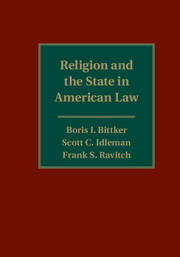Book contents
- Frontmatter
- Dedication
- Contents
- Preface
- 1 History and Introduction
- 2 Church and State in the Nineteenth Century
- 3 Religious Influences and Expressions in Law and Government
- 4 The Establishment Clause
- 5 The Free Exercise Clause
- 6 The Religious Test, Equal Protection, and Free Speech Clauses
- 7 The Definition of Religion
- 8 Church Property Disputes and Church Schisms
- 9 Contracts
- 10 Taxation
- 11 Employment
- 12 Land Use
- 13 Torts
- 14 Criminal Law and Process
- 15 Family Law
- 16 Public Education
- 17 Religious Symbolism on Government Property
- 18 Special Contexts: Prisons and the Military
- Appendix A Federal Constitutional Provisions
- Appendix B State Constitutional Provisions
- Appendix C Selected Federal Statutes 910
- Index
1 - History and Introduction
Published online by Cambridge University Press: 05 October 2015
- Frontmatter
- Dedication
- Contents
- Preface
- 1 History and Introduction
- 2 Church and State in the Nineteenth Century
- 3 Religious Influences and Expressions in Law and Government
- 4 The Establishment Clause
- 5 The Free Exercise Clause
- 6 The Religious Test, Equal Protection, and Free Speech Clauses
- 7 The Definition of Religion
- 8 Church Property Disputes and Church Schisms
- 9 Contracts
- 10 Taxation
- 11 Employment
- 12 Land Use
- 13 Torts
- 14 Criminal Law and Process
- 15 Family Law
- 16 Public Education
- 17 Religious Symbolism on Government Property
- 18 Special Contexts: Prisons and the Military
- Appendix A Federal Constitutional Provisions
- Appendix B State Constitutional Provisions
- Appendix C Selected Federal Statutes 910
- Index
Summary
Church-State Relations in the Colonies from Their Founding to the Declaration of Independence
1. Introduction
During the century and a half that passed between the first permanent English settlements in Virginia (1607) and Massachusetts (1620) and the signing of the Declaration of Independence, there were seismic changes in the political and religious characteristics of the colonies that became the thirteen original states of the Union. Although liberty proved to be the ultimate destination in both these arenas, the journeys were taken in fits and starts rather than smoothly, and the process of change took longer in the church-state relationships than in the political links between the colonies and England. Political liberty for the United States was presaged in 1776 by the Declaration of Independence and was recognized by Great Britain in 1783 in the Treaty of Paris and a second time in 1814 in the Treaty of Ghent, which ended the War of 1812 (sometimes called our “second war of independence”). Neither treaty dealt with religious issues. The Treaty of Paris, however, was dipped in religiosity: it was promulgated “[i]n the name of the Most Holy and Undivided Trinity,” credited “Divine Providence” with having disposed the two parties to “forget all past misunderstandings,” and is dated “in the year of our Lord” 1783.
The achievement of religious liberty in America, by contrast, was not declared or recognized by so crisp an event or document, and attainment of that goal proceeded separately in each of the colonies, unlike the achievement of political independence, which occurred for all the colonies at the national level. Moreover, disestablishment of the state church in Massachusetts did not occur until 1833, and as late as 1892, a unanimous Supreme Court quoted, seemingly with approval, the proposition that Christianity was part of the common law of Pennsylvania and, by implication, of the other states as well. As recently as 1961, Maryland urged (though without success) that the Supreme Court should uphold the validity of its antiquated constitutional provision requiring candidates for the post of notary public to declare their belief in the existence of God, and every year this provision spawns a sizable body of church-state lawsuits, as this work will demonstrate.
- Type
- Chapter
- Information
- Religion and the State in American Law , pp. 1 - 78Publisher: Cambridge University PressPrint publication year: 2015



